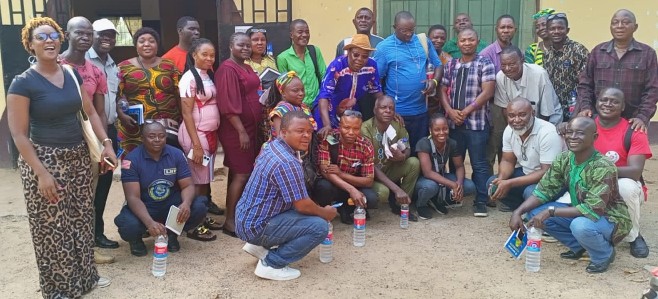As Liberia Peace Building Office Holds Stakeholders Civic Engagement In Lofa County
By Tokpa Tarnue- tarnue82@gmail.com
VOINJAMA, Liberia- Here in the northwestern Lofa County, the Liberia Peace Building Office at the Ministry of Internal Affairs, with support from the United Nations Development Program (UNDP), has ended a two-day Civic Engagement Meeting to promote non-violence elections and human rights protection in the pending presidential and legislative elections.
Participants at the civic engagement identified several factors which they considered as issues currently happening in the county that could result to electoral violence.
They named traditional or cultural practices, tribalism, hate messages in media institutions (Political Stations) by their owners as well as insincerity by both politicians or political parties and some citizens.
The two-day event brought together representatives from various political parties, joint securities, religious communities, the media and civil society organizations amongst others.
According to Curtis G. Dabieh, National Monitoring and Evaluation Officer of the Liberia Peace Building Office, the project is being implemented in four counties including Nimba, Gbapolu, Grand Cape Mount and Lofa Counties respectively.
Mr. Dabieh named topics treated over the two days as: Understanding the Current Situations on the Ground, Introduction to Electoral Violence and its Preventions and Factors Causing Electoral Violence.
Other topics covered are, Introduction to Human Rights Violations During Elections and The Roles of Electoral Management Body in Elections, which include the media, the police, political parties, the National Elections Commission and civil society organizations.
Speaking further, Mr. Dabieh disclosed that participants at the engagement are expected to serve as ambassadors in their respective organizations and communities to rollout the outcomes of the just ended two-day civic engagement.
“It is better to identify potential threats that could lead to electoral violence than finding solutions after it has occurred,” he pointed out.
The over 25 participants also advanced several recommendations ranging from decentralizing its civic engagements to the rural communities that will include local chiefs as well and the holding of major conference or conferences with media owners and media operators on the danger of preaching hate messages on their various platforms or institutions in the county.
They also called on the national elections commission to utilized local structures or groups in order to speed up voter education in all of the communities by using the various vernaculars.

